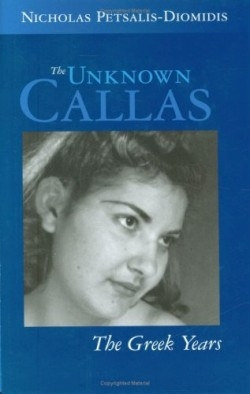It looks like you've stumbled upon a page meant to be read by our code instead of viewed directly. You're probably looking for this page.
The Unknown Callas
The Greek Years
Over twenty-three years after her death, Maria Callas is still one of the best known and best-selling opera singers in the world. It has been estimated that more than 30,000,000 of her records, cassettes, and CDs had been sold and sales continue at over 750,000 each year. Interest in Callas remains strong, both as the diva on stage and off.
Petsalis-Diomidis’ biography, focusing on the origins of Callas’ career and the experiences that helped create the prima donna, covers the years from 1937-1945 while, aged thirteen through twenty-one, she was living in Greece. Through hundreds of interviews with Callas’ contemporaries and colleagues and archivaled materials in Athens, he looks into her early life, her studies with Maria Trivella and Elvira de Hidalgo, and the many singing experiences that gave her personal satisfaction and self confidence. The biographer challenges many of the Callas myths perpetuated both by Callas herself and in much of the literature about her; her youthful weight, general appearance, and loneliness were described by various sources as: “… [she was] really fat, especially from the waist down,” and “her clothes were often a disgrace, and sometimes she wore long, gaudy-colored woolen stockings with her tarty sandals. She was an awful sight.” These were relatively unimportant, according to Petsalis-Diomidis, except as they helped shaped Callas’ dedication to and obsession with her singing.
In fact, challenges such as her nearsightedness (“without glasses, she couldn’t see a meter and thus was unable to see a conductor”) and a noticeable break between registers of her voice forced Callas, when she received a role in an opera, both to memorize the complete opera prior to opening rehearsals, and to explore ways to minimize any voice flaws through her interpretation of the character. As she herself said: “It is not enough to have a beautiful voice. When you have to interpret a role, you have to have thousands of colors during the performance to portray words you [sing] happiness, joy, unhappiness, sorrow, fear… even if you have to sing harshly at times— which I have done frequently. It is a necessity of expression, it is written there, you have to do it, even it people will not understand. But in the long run, they will, because you have to persuade people of what you are doing.”
The author also recounts incidents from her daily life, studies at the conservatory, friendships and rivalries, early romances, early concerts and performance, experiences with the occupying German and Italian forces during WWII, perceived collaborations with the enemy, and relationships with her sister and mother. Underlying everything, though, is Callas as a sponge, absorbing opera with her whole being. As Callas describes, “[de Hidalgo] tells the story of how I turned up for my lesson every morning at ten and stayed to hear all the other lessons, until six in the evening. If I know such a vast operatic repertoire, I perhaps owe that precisely to that fact, to that thirst for advice and instruction of which I wasn’t even aware then.”
Included are several “roots” chapters, exploring her family origins starting about 1880 and her early childhood years in New York City and three postscript chapters assessing her impact on opera, the intrigues surrounding her death, and the final breach with her mother. An appendix lists appearances and repertoire between 1938-1945, and sources, including a bibliography.
This is an enjoyable, novelistic biography that, although detailed and factual, never loses its story in a maze of dates and “important incidents.” The author effectively includes many statements, both oral and written, by Callas herself about her youth that gives the effect of a commentary by the subject on her own life. The keys to understanding Callas, as Petsalis-Diomidis stresses, is her relationship with her mother, a relationship that evolved in Maria from resentment to hatred, with Callas cutting her out of her life completely; and her obsession with her work. As Callas says “I do not believe with Descartes: ‘I think, therefore I am.’ With me it is ‘I work, therefore I am.’”
Petsalis-Diomidis, a historian living in Greece, studied law at Athens University and history at the London School of Economics. The biography, originally published in Greek in 1998, won Greece’s National Biography Award in 1999.
Reviewed by
David Reid
Disclosure: This article is not an endorsement, but a review. The publisher of this book provided free copies of the book to have their book reviewed by a professional reviewer. No fee was paid by the publisher for this review. Foreword Reviews only recommends books that we love. Foreword Magazine, Inc. is disclosing this in accordance with the Federal Trade Commission’s 16 CFR, Part 255.
